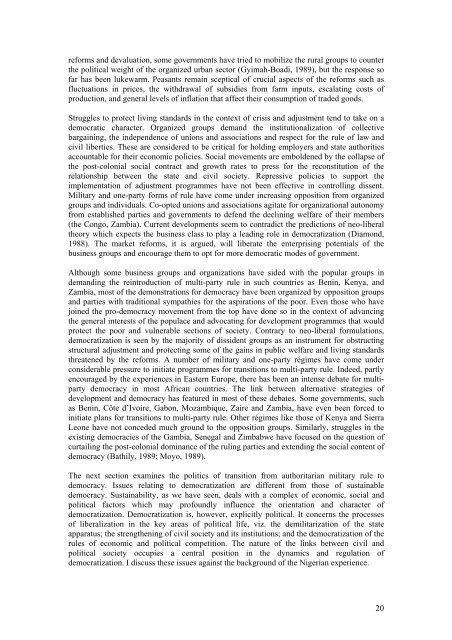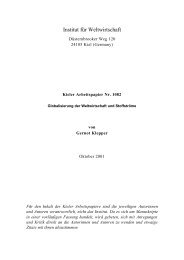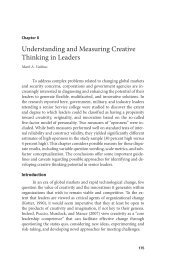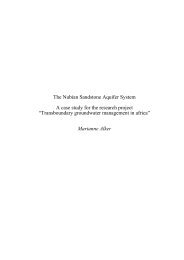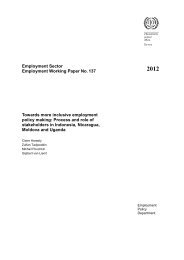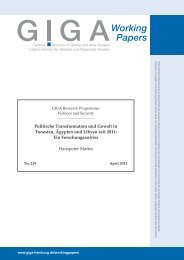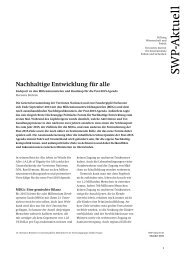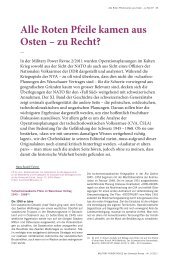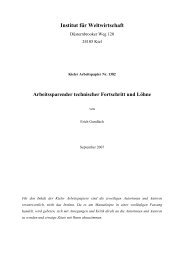Authoritarian Rule and Democracy in Africa: A Theoretical Discourse
Authoritarian Rule and Democracy in Africa: A Theoretical Discourse
Authoritarian Rule and Democracy in Africa: A Theoretical Discourse
Create successful ePaper yourself
Turn your PDF publications into a flip-book with our unique Google optimized e-Paper software.
eforms <strong>and</strong> devaluation, some governments have tried to mobilize the rural groups to counterthe political weight of the organized urban sector (Gyimah-Boadi, 1989), but the response sofar has been lukewarm. Peasants rema<strong>in</strong> sceptical of crucial aspects of the reforms such asfluctuations <strong>in</strong> prices, the withdrawal of subsidies from farm <strong>in</strong>puts, escalat<strong>in</strong>g costs ofproduction, <strong>and</strong> general levels of <strong>in</strong>flation that affect their consumption of traded goods.Struggles to protect liv<strong>in</strong>g st<strong>and</strong>ards <strong>in</strong> the context of crisis <strong>and</strong> adjustment tend to take on ademocratic character. Organized groups dem<strong>and</strong> the <strong>in</strong>stitutionalization of collectivebarga<strong>in</strong><strong>in</strong>g, the <strong>in</strong>dependence of unions <strong>and</strong> associations <strong>and</strong> respect for the rule of law <strong>and</strong>civil liberties. These are considered to be critical for hold<strong>in</strong>g employers <strong>and</strong> state authoritiesaccountable for their economic policies. Social movements are emboldened by the collapse ofthe post-colonial social contract <strong>and</strong> growth rates to press for the reconstitution of therelationship between the state <strong>and</strong> civil society. Repressive policies to support theimplementation of adjustment programmes have not been effective <strong>in</strong> controll<strong>in</strong>g dissent.Military <strong>and</strong> one-party forms of rule have come under <strong>in</strong>creas<strong>in</strong>g opposition from organizedgroups <strong>and</strong> <strong>in</strong>dividuals. Co-opted unions <strong>and</strong> associations agitate for organizational autonomyfrom established parties <strong>and</strong> governments to defend the decl<strong>in</strong><strong>in</strong>g welfare of their members(the Congo, Zambia). Current developments seem to contradict the predictions of neo-liberaltheory which expects the bus<strong>in</strong>ess class to play a lead<strong>in</strong>g role <strong>in</strong> democratization (Diamond,1988). The market reforms, it is argued, will liberate the enterpris<strong>in</strong>g potentials of thebus<strong>in</strong>ess groups <strong>and</strong> encourage them to opt for more democratic modes of government.Although some bus<strong>in</strong>ess groups <strong>and</strong> organizations have sided with the popular groups <strong>in</strong>dem<strong>and</strong><strong>in</strong>g the re<strong>in</strong>troduction of multi-party rule <strong>in</strong> such countries as Ben<strong>in</strong>, Kenya, <strong>and</strong>Zambia, most of the demonstrations for democracy have been organized by opposition groups<strong>and</strong> parties with traditional sympathies for the aspirations of the poor. Even those who havejo<strong>in</strong>ed the pro-democracy movement from the top have done so <strong>in</strong> the context of advanc<strong>in</strong>gthe general <strong>in</strong>terests of the populace <strong>and</strong> advocat<strong>in</strong>g for development programmes that wouldprotect the poor <strong>and</strong> vulnerable sections of society. Contrary to neo-liberal formulations,democratization is seen by the majority of dissident groups as an <strong>in</strong>strument for obstruct<strong>in</strong>gstructural adjustment <strong>and</strong> protect<strong>in</strong>g some of the ga<strong>in</strong>s <strong>in</strong> public welfare <strong>and</strong> liv<strong>in</strong>g st<strong>and</strong>ardsthreatened by the reforms. A number of military <strong>and</strong> one-party régimes have come underconsiderable pressure to <strong>in</strong>itiate programmes for transitions to multi-party rule. Indeed, partlyencouraged by the experiences <strong>in</strong> Eastern Europe, there has been an <strong>in</strong>tense debate for multipartydemocracy <strong>in</strong> most <strong>Africa</strong>n countries. The l<strong>in</strong>k between alternative strategies ofdevelopment <strong>and</strong> democracy has featured <strong>in</strong> most of these debates. Some governments, suchas Ben<strong>in</strong>, Côte d’Ivoire, Gabon, Mozambique, Zaire <strong>and</strong> Zambia, have even been forced to<strong>in</strong>itiate plans for transitions to multi-party rule. Other régimes like those of Kenya <strong>and</strong> SierraLeone have not conceded much ground to the opposition groups. Similarly, struggles <strong>in</strong> theexist<strong>in</strong>g democracies of the Gambia, Senegal <strong>and</strong> Zimbabwe have focused on the question ofcurtail<strong>in</strong>g the post-colonial dom<strong>in</strong>ance of the rul<strong>in</strong>g parties <strong>and</strong> extend<strong>in</strong>g the social content ofdemocracy (Bathily, 1989; Moyo, 1989).The next section exam<strong>in</strong>es the politics of transition from authoritarian military rule todemocracy. Issues relat<strong>in</strong>g to democratization are different from those of susta<strong>in</strong>abledemocracy. Susta<strong>in</strong>ability, as we have seen, deals with a complex of economic, social <strong>and</strong>political factors which may profoundly <strong>in</strong>fluence the orientation <strong>and</strong> character ofdemocratization. Democratization is, however, explicitly political. It concerns the processesof liberalization <strong>in</strong> the key areas of political life, viz. the demilitarization of the stateapparatus; the strengthen<strong>in</strong>g of civil society <strong>and</strong> its <strong>in</strong>stitutions; <strong>and</strong> the democratization of therules of economic <strong>and</strong> political competition. The nature of the l<strong>in</strong>ks between civil <strong>and</strong>political society occupies a central position <strong>in</strong> the dynamics <strong>and</strong> regulation ofdemocratization. I discuss these issues aga<strong>in</strong>st the background of the Nigerian experience.20


